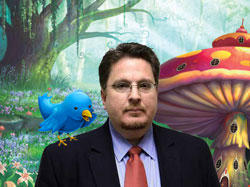In a post titled “Newspapers and Thinking the Unthinkable,” Clay Shirky provides some insight –and historical perspective– on what’s happening to newspapers. He starts with the question often asked by those committed to saving newspapers
“If the old model is broken, what will work in its place?” To which the answer is: Nothing. Nothing will work. There is no general model for newspapers to replace the one the internet just broke.”
“With the old economics destroyed, organizational forms perfected for industrial production have to be replaced with structures optimized for digital data. It makes increasingly less sense even to talk about a publishing industry, because the core problem publishing solves — the incredible difficulty, complexity, and expense of making something available to the public — has stopped being a problem.”
“When someone demands to be told how we are going to replace newspapers, they are really demanding to be told that we are not living through a revolution. They are demanding to be told that old systems won’t break before new systems are in place. They are demanding to be told that ancient social bargains aren’t in peril, that core institutions will be spared, that new methods of spreading information will improve previous practice rather than upending it. They are demanding to be lied to. There are fewer and fewer people who can convincingly tell such a lie.”
I think this is the first time I’ve fully understood that old models can be broken before new ones are there to take their place.

 I’m one of a few hundred (but growing fast) “followers” of Tony Mesenger’s Twitter feed. Tony’s a reporter and columnist for the St. Louis Post-Dispatch and covers the Missouri Legislature and state government. He clearly gets Twitter and blogging and makes great use of both.
I’m one of a few hundred (but growing fast) “followers” of Tony Mesenger’s Twitter feed. Tony’s a reporter and columnist for the St. Louis Post-Dispatch and covers the Missouri Legislature and state government. He clearly gets Twitter and blogging and makes great use of both.